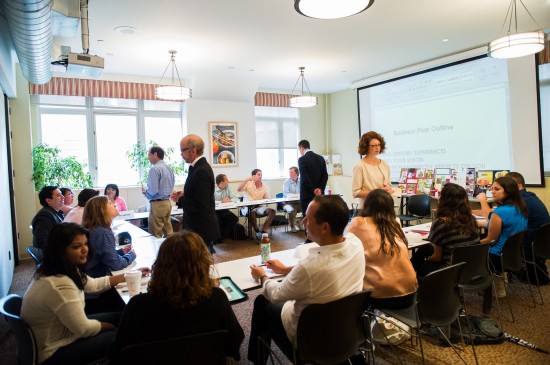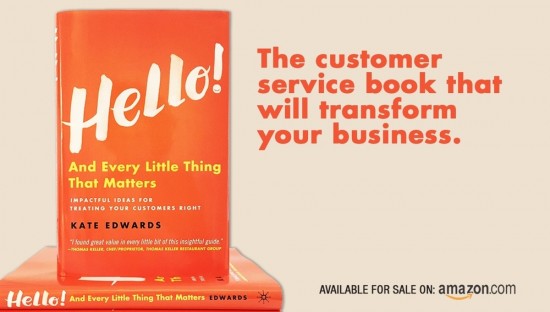When it comes to hospitality, ICE Culinary Management Instructor Kate Edwards ranks among the industry’s most respected service experts. With a resume that includes stints at Keith McNally’s Balthazar bistro and Thomas Keller’s fine-dining mecca, Per Se, Kate has long worked with the food industry’s finest.
 With the recent release of her first book—Hello! And Every Little Thing That Matters—she’s sharing her service secrets with aspiring hospitality professionals in the food industry and beyond. We sat down with our resident service all-star to learn her make-or-break tips for restaurant success.
With the recent release of her first book—Hello! And Every Little Thing That Matters—she’s sharing her service secrets with aspiring hospitality professionals in the food industry and beyond. We sat down with our resident service all-star to learn her make-or-break tips for restaurant success.
First and foremost, what inspired you to write this book?
The idea for the book came to me as early as 2008. I had some theories about what makes great service, but I needed to prove the theories to write a book. Since that time, I’ve pursued a wide range of consulting projects in addition to teaching at ICE, which allowed me to refine my thoughts. In 2011, I wrote the book proposal, and five years later, here we are!
Why do you think the industry needs a new manual for service?
The book started as something that was specific to the restaurant industry, but the final version deals with service across all industries. Service has never been more crucial in business; it’s the most important added value that a company can use to differentiate itself in the market.
What are some of your core principles for great service?
The guest experience is comprised of everything you deliver—from the initial greeting to crumbs on the banquette, to a flickering light bulb overhead. Beyond that, my background is in theater, and I quickly realized that working in hospitality isn’t that different from the stage: all eyes are on you. You must be incredibly self-aware because people are always watching, and your passive actions speak volumes. I believe in a theory that I call “I notice = I care.” In our business, everyone is trying to tell people to be empathetic, altruistic, etc. But that’s not a direction you can give; being empathetic isn’t a practical command.
However, asking your staff to notice the things that affect your guests—and to act on what they notice—will raise the level of service and result in your customers feeling cared for. It ultimately becomes a game for the employees. Once they have a specific goal in mind—notice your customers and act on what you see—they know how to win.
We also need to consider that some people are more gifted at service than others. What are your top tips for hiring service professionals?
In an interview, I always ask a potential employee to tell a story. Tell me about a time that you made something better for someone—either another colleague or a guest. The way they tell the story and the details they remember will tell you an incredible amount about them. I also encourage companies I consult with to establish their core values and to use those values in hiring.
For example, if honesty is one of your values, ask an interviewee to tell you about a time they had to share some unfortunate news or feedback for another person’s benefit. It’s through these strategic questions that you learn if someone is drinking the Kool-Aid that fuels your business.

Within the realm of service, are there any leaders you particularly respect?
Tony Hsieh of Zappos is incredibly inspiring as a leader and an author. His Delivering Happiness is so user-friendly; it’s a first-person story that is very relatable, and he shares case studies from his business. Hospitality starts in the interactions between employees—even before the guests are involved—and he’s built a brand that people are excited to work for.
In the restaurant industry itself, I have a great deal of respect for Keith McNally. I worked with him for seven years and he always said, “Just be decent to people.” It was an earnest plea, and it made me realize that hospitality isn’t always about going above and beyond. Most people just want to be recognized and treated fairly.
You’ve already enjoyed quite a deal of success since the book’s release. What are your hopes for the future?
I’ve had people tell me they were going to use my book as a manual for their teams. Obviously, every company needs to have their own, personalized handbook, but I do hope that Hello! can be a trusty, dog-eared guide—a way for hospitality professionals to reset their batteries and gain some perspective.
Interested in studying service with Kate? Click here to request free information about the Culinary Management program at ICE.




